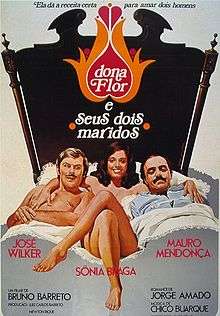Dona Flor and Her Two Husbands
| Dona Flor and Her Two Husbands | |
|---|---|
 Film poster | |
| Directed by | Bruno Barreto |
| Produced by |
|
| Written by |
|
| Based on |
Dona Flor e Seus Dois Maridos by Jorge Amado |
| Starring | |
| Music by | |
| Cinematography | Murilo Salles |
| Edited by | Raimundo Higino |
| Distributed by | Embrafilme |
Release dates |
|
Running time | 110 minutes |
| Country | Brazil |
| Language | Portuguese |
Dona Flor and Her Two Husbands (Portuguese: Dona Flor e Seus Dois Maridos) is a 1976 comedy film directed by Bruno Barreto. Based on the novel of the same name by Jorge Amado, it takes place in 1940s Bahia. It stars Sônia Braga, José Wilker and Mauro Mendonça in the leading roles. The screenplay was adapted by Barreto, Eduardo Coutinho and Leopoldo Serran.
When initially released, Dona Flor became the most successful film in Brazilian history. Its box office was only reached by a Brazilian production 35 years later by the 2010 blockbuster Elite Squad: The Enemy Within. Internationally, Dona Flor received nominations for a Golden Globe and a BAFTA Award.
In 1982, an American remake titled Kiss Me Goodbye, starring Sally Field, James Caan, and Jeff Bridges in the leading roles, was released.
Plot
Vadinho (José Wilker), Flor's irresponsible husband, drops dead while dancing in a street carnival party. Only Flor (Sônia Braga) expresses remorse after his death. Flor's friends and family see Vadinho's death as a chance for Flor to find happiness after the misery brought upon her by Vadinho's spendthrift ways and near total lack of respectability. Roughly the first half of Dona Flor recounts Flor's marriage with Vadinho in an extended flashback. What is made clear is that Vadinho was a great lover who admired his wife's respectability, but enjoyed protracted foreplay until she begged him to continue. He might not paint the house or leave her savings alone, but he changed this inhibited girl into a wife who experienced carnal joy regularly.
The second half of Dona Flor involves Flor's meeting the respectable but extraordinarily dull pharmacist Teodoro (Mauro Mendonça), his courtship of her, and her marriage to him. Flor's friends consider Teodoro the exact opposite of Vadinho. Teodoro belongs in superior circles within Bahia's society, dresses elegantly, and treats Flor like a lady. What Flor's friends do not know is that Teodoro is also the opposite of Vadinho in one more respect: in bed, Teodoro is as lacking as Vadinho was accomplished.
On the anniversary of Vadinho's death, Vadinho reappears to Flor in the nude and explains that she called him to "share her bed" with him. Only Flor can see and hear the nude spirit of Vadinho. She protests because she is now remarried and has pledged to be faithful to Teodoro, but after Vadinho laughs during Teodoro's pathetic attempts at love-making that night, Flor gives in and lives happily with both husbands. A shot toward the end of the film shows Teodoro lying in bed next to Flor, who kisses him on the cheek. The camera then pans to the left to show Vadinho on Flor's other side and she kisses him on the cheek too.
Awards and nominations
- Best Leading Newcomer – Sônia Braga (nominated)
- Best Foreign Language Film (nominated)
- Best Film – Bruno Barreto (nominated)
- Best Director – Bruno Barreto (won)
- Best Film Music – Francis Hime (won)
- Special Jury Award – Anisio Medeiros, production designer (won)
References
- Bergan, Ronald and Robyn Karney. The Faber Companion to Foreign Films. Boston: Faber and Faber, 1992.
- Creed-Miles, Jo. "Dona Flor and Her Two Husbands (Dona Flor e Seus Dois Maridos)." TimeOut Film Guide. Ed. John Pym. London: Penguin Books, 2003.
External links
| ||||||